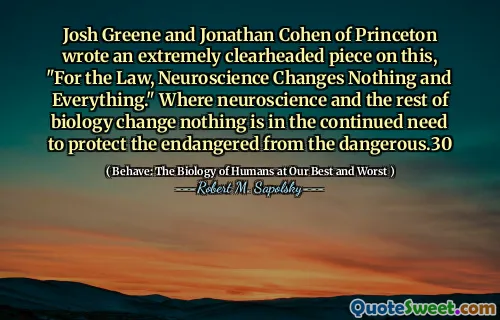Robert M. Sapolsky is a distinguished neuroscientist, primatologist, and author known for his extensive research on stress and behavior. He has a unique approach that combines biology with insights from psychology and sociology, demonstrating how complex interactions between these fields influence human and animal behavior. His studies often involve the effects of stress hormones on the brain, providing a deeper understanding of how stress impacts health and decision-making. In addition to his scientific research, Sapolsky is recognized for his engaging writing style, making complex scientific concepts accessible to a general audience. His books, including "Why Zebras Don’t Get Ulcers," address stress management and its implications for health, while highlighting the evolutionary perspective of stress responses in different species. He aims to bridge the gap between science and lay understanding, promoting a broader awareness of the biological underpinnings of behavior. Sapolsky also teaches at Stanford University, where he shares his passion for biology and the behavioral sciences with students. His lectures are well-received for their wit and insight, encouraging critical thinking about the interconnectedness of biology, environment, and culture. Through his work, Sapolsky continues to inspire curiosity and discussion around the complexities of human and animal behavior within their ecosystems.
Robert M. Sapolsky is a distinguished neuroscientist and primatologist known for his studies on stress and behavior.
He combines insights from biology, psychology, and sociology to explore how these fields influence health and decision-making.
As a teacher at Stanford University, Sapolsky engages students and the public with his accessible writing and lectures on complex scientific concepts.
More »
Today Birthdays
1729 -
Edmund Burke
1949 -
Haruki Murakami
1954 -
Howard Stern
1876 -
Jack London
1993 -
Zayn Malik
1951 -
Kirstie Alley
1863 -
Swami Vivekananda
1923 -
Alice Miller
1987 -
Naya Rivera
1825 -
Brooke Foss Westcott
1944 -
Joe Frazier
1951 -
Rush Limbaugh
1964 -
Jeff Bezos
1978 -
Jeremy Camp
1628 -
Charles Perrault
1856 -
John Singer Sargent
1970 -
Kaja Foglio
1953 -
Rick Santelli
1986 -
Gemma Arterton
1968 -
Raf Simons
1958 -
Christiane Amanpour
1966 -
Olivier Martinez
1996 -
Ella Henderson
1917 -
Maharishi Mahesh Yogi
1949 -
Ottmar Hitzfeld
1928 -
Ruth Brown
1968 -
Heather Mills
1946 -
George Duke
1968 -
Rachael Harris
1923 -
Ira Hayes





